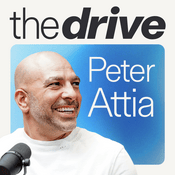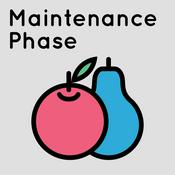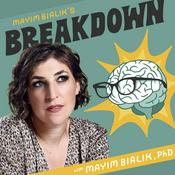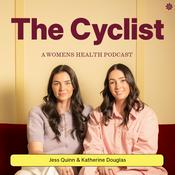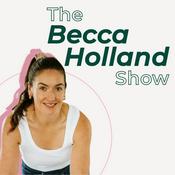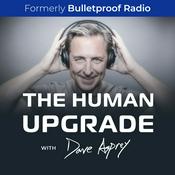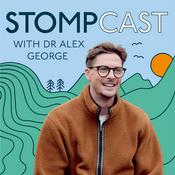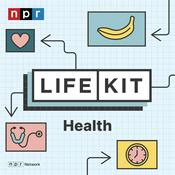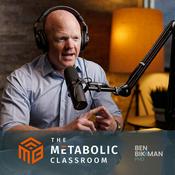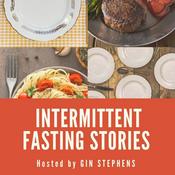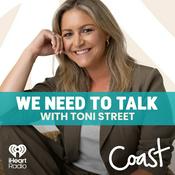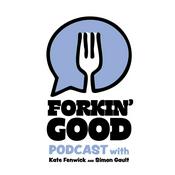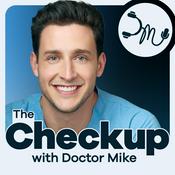165 episodes

Prediabetes, Gut Issues, Brain Fog, High Blood Pressure, & Fatigue from Low-Carb & Fasting
08/1/2026 | 42 mins.
Check out the Energy Balance Food Guide here: https://ww.jayfeldmanwellness.com/guide/ Timestamps: 0:00 – intro 1:03 – introducing Andrew Wallen 1:50 – Andrew’s background in sports, powerlifting, bodybuilding, and Brazilian Jiu-Jitsu 6:20 – Andrew’s experience cycling through various dietary camps (CICO, paleo, ancestral, carnivore, fasting, low-carb, etc.) 12:04 – whether we should shape our diets around what our ancestors did 15:15 – how low-carb, keto, and fasting diets elevated stress and caused blood sugar issues for Andrew 20:45 – “optimal” blood glucose, HRV, and resting heart rate despite crashing health 23:50 – how stress-inducing (hormetic) health practices led to binging, self-blame, low brain energy, high blood pressure, and weakened immune function 27:36 – low-carb, keto, carnivore, fasting, and fear about reintroducing carbs 33:13 – Andrew’s breaking point with health and what led him to start questioning what being “healthy” really meant 36:27 –exercise intolerance, fatigue, pre-diabetes, high blood pressure, brain fog, gut issues, slow motility, and poor sleep: the product of years of low-carb and fasting

How To Avoid Heavy Metals, Microplastics, PFAS, & Estrogenic Compounds in Your Home & Body
18/12/2025 | 36 mins.
https://www.jayfeldmanwellness.com/healthy/ Check out the Energy Balance Solution program here: https://www.jayfeldmanwellness.com/solution/ Click here to check out the show notes: https://www.jayfeldmanwellness.com/non-toxic-product-recommendations-for-your-home-body-cookware-skincare-clothing-emfs-more/ Timestamps: 0:00 – intro 0:53 – misconceptions regarding the Randle cycle in the alternative health world 4:57 – what is the Randle cycle? 7:06 – what most people get wrong about the Randle cycle 10:44 – fat oxidation leads to increased ROS production and a decreased NAD+/NADH ratio 16:29 – how fat oxidation inhibits the utilization of carbohydrates 21:03 – the Randle cycle shows the benefits of burning carbs for energy 25:56 – how fat oxidation inhibits the utilization of carbohydrates cont’d 26:57 – metabolic dysfunction, not glucose, drives insulin resistance and aging 32:07 – fat metabolism causes a buildup of citrate which reduces glucose uptake and utilization 38:39 – how glucose oxidation inhibits the uptake and utilization of fats 45:32 – whether you can “activate” or “deactivate” the Randle cycle 47:22 – glucose oxidation leads to an optimal NAD+/NADH ratio and decreased ROS production 52:08 – the protective effects of CO2 and why the brain can’t use fats as a fuel 53:17 – whether we should strive for metabolic flexibility 55:55 – fat metabolism and ketone production as a mechanism for energy conservation and glucose sparing 1:00:02 – insulin resistance as a state of excess fat metabolism and decreasing fat metabolism or stress hormones improves this state 1:05:28 – should we avoid eating carbs and fats together due to the Randle cycle? 1:08:08 – different cells, tissues, and organs can use different fuels at the same time

EB. 139: The Truth About the Randle Cycle: Why You Can Eat Carbs and Fats Together
25/11/2025 | 1h 13 mins.
In this episode we discuss: How the Randle Cycle actually works Whether eating carbs and fats in the same meal causes weight gain and insulin resistance The efficiency of using fats as a fuel vs carbohydrate How stress impacts fuel usage in the mitochondria How to determine the optimal amount of carbs and fats in your diet Check out the Energy Balance Solution program here: https://www.jayfeldmanwellness.com/solution/ Click here to check out the show notes: https://www.jayfeldmanwellness.com/eb-139-the-truth-about-the-randle-cycle-why-you-can-eat-carbs-and-fats-together/ Timestamps: 0:00 – intro 0:53 – misconceptions regarding the Randle cycle in the alternative health world 4:57 – what is the Randle cycle? 7:06 – what most people get wrong about the Randle cycle 10:44 – fat oxidation leads to increased ROS production and a decreased NAD+/NADH ratio 16:29 – how fat oxidation inhibits the utilization of carbohydrates 21:03 – the Randle cycle shows the benefits of burning carbs for energy 25:56 – how fat oxidation inhibits the utilization of carbohydrates cont’d 26:57 – metabolic dysfunction, not glucose, drives insulin resistance and aging 32:07 – fat metabolism causes a buildup of citrate which reduces glucose uptake and utilization 38:39 – how glucose oxidation inhibits the uptake and utilization of fats 45:32 – whether you can “activate” or “deactivate” the Randle cycle 47:22 – glucose oxidation leads to an optimal NAD+/NADH ratio and decreased ROS production 52:08 – the protective effects of CO2 and why the brain can’t use fats as a fuel 53:17 – whether we should strive for metabolic flexibility 55:55 – fat metabolism and ketone production as a mechanism for energy conservation and glucose sparing 1:00:02 – insulin resistance as a state of excess fat metabolism and decreasing fat metabolism or stress hormones improves this state 1:05:28 – should we avoid eating carbs and fats together due to the Randle cycle? 1:08:08 – different cells, tissues, and organs can use different fuels at the same time

EB. 138: How Low-Carb Diets Worsen AGE Formation (and What to Do Instead)
05/11/2025 | 1h 9 mins.
In this episode we discuss: How glucose and insulin decrease glycation Why ketogenic diets can be worse than high-carb diets when it comes to AGE formation How autophagy helps to clear AGEs, but increasing autophagy is not the answer The true primary drivers of AGE accumulation The best diet and supplements for minimizing glycation Check out the Energy Balance Solution program here: https://www.jayfeldmanwellness.com/solution/ Click here to check out the show notes: https://www.jayfeldmanwellness.com/eb-138-low-carb-diets-increase-glycation-and-what-to-do-instead/ Timestamps: 0:00 – intro 0:57 – how glycation products are detoxified and cleared from the body 4:03 – glycation detoxification is impaired by oxidative stress and inflammation, as seen in type 2 diabetes 7:56 – the benefits of carbohydrates for the detoxification of glycation products 10:42 – the benefits of insulin for the detoxification of glycation products 12:45 – how AGEs are cleared 14:36 – increasing autophagy via hormesis is not the answer for clearing AGEs 19:09 – autophagy can drive disease 20:50 – ATP protects against oxidative stress and allows for proper autophagy when needed 24:37 – impaired mitochondrial along with fatty acid oxidation impairs autophagy and increases oxidative stress 26:54 – carbohydrates do NOT inhibit autophagy 29:18 – adequate thyroid hormone supports proper autophagy 30:15 – adequate ATP and mitochondrial function is needed for the UPS (ubiquitin proteasome system) 32:56 – do high-carb diets actually impair metabolism and insulin sensitivity 35:26 – is fructose really worse for blood sugar regulation and glycation? 37:16 – are low-carb or ketogenic diets the solution to reduce glycation? 40:32 – increased glycation and oxidative stress on ketogenic diets 44:09 –low-carb diets don’t prevent glucose exposure 47:56 – there are still considerable insulin and glucose excursions on low-carb diets 50:06 – gluconeogenesis leads to same glycolytic intermediates as glucose metabolism 51:52 –the main driver of AGE formation and impaired AGE clearance 53:40 – the role of vitamin B1 (thiamine) and mitochondrial energy production in decreasing AGEs 56:27 –endotoxin as a driver of glycation and increased AGE production 58:12 – hypothyroidism as a driver of glycation and AGE accumulation 59:37 – dietary solutions for reducing glycation and AGEs 1:03:33 – how to support the glyoxalase pathway to support the detoxification of glycation products 1:05:56 – avoid calorie restriction, low-carb diets, fasting, resveratrol, cold exposure, excess exercise, and iron overload to decrease glycation and AGEs 1:07:33 – iron as a double-edged sword for oxidative stress

EB. 137: What REALLY Causes Glycation (Is Sugar Really the Problem?)
29/10/2025 | 55 mins.
In this episode we discuss: Why glucose and fructose are not the primary drivers of AGE formation Whether blood sugar spikes cause glycation How fats and ketones can cause glycation What’s really responsible for glycation in type 2 diabetes Whether fructose causes more glycation than glucose Check out the Energy Balance Solution program here: https://www.jayfeldmanwellness.com/solution/ Click here to check out the show notes: https://www.jayfeldmanwellness.com/eb-137-what-really-causes-glycation-is-sugar-really-the-problem/ Timestamps: 0:00 – intro 0:46 – common beliefs about carbohydrates and glycation 2:35 – what are glycation and advanced glycation end products? 6:57 – the process of glycation from glucose 9:30 – is sugar the only source of AGEs? 15:00 – primary drivers of glycation: dicarbonyls 19:30 – how fatty acids, amino acids, and ketones cause AGE formation 21:23 – how increased gluconeogenesis on low-carb diets increases AGE formation 22:53 – glucose metabolism produces very few glycation products in the context of a healthy metabolism 25:33 – omega-6s form AGEs more than 10x faster than glucose 28:24 – the role of ALEs (advanced lipoxidation end products) in glycation and chronic disease 30:36 – whether blood sugar spikes cause glycation 38:52 – whether fructose causes more glycation (or fructation) than glucose 47:05 – can glycation from fructose (fructation) be measured, and does this matter? 52:06 – problems with research looking at fructose’s AGE formation in animal models
More Health & Wellness podcasts
Trending Health & Wellness podcasts
About The Energy Balance Podcast
Listen to The Energy Balance Podcast, Feel Better, Live More with Dr Rangan Chatterjee and many other podcasts from around the world with the radio.net app
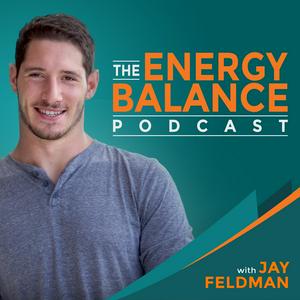
Get the free radio.net app
- Stations and podcasts to bookmark
- Stream via Wi-Fi or Bluetooth
- Supports Carplay & Android Auto
- Many other app features
Get the free radio.net app
- Stations and podcasts to bookmark
- Stream via Wi-Fi or Bluetooth
- Supports Carplay & Android Auto
- Many other app features


The Energy Balance Podcast
download the app,
start listening.






